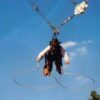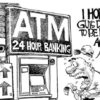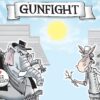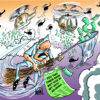Wild Bill Hickok
![]()
Wild Bill Hickok
From Wikipedia, the free encyclopedia
Jump to navigationJump to search
For the American football player and industrialist, see Bill Hickok (American football). For other uses of “Wild Bill”, see Wild Bill (disambiguation).
| Wild Bill Hickok | |
|---|---|
| Born | James Butler Hickok May 27, 1837 Homer, Illinois, U.S. (now Troy Grove, Illinois, U.S.) |
| Died | August 2, 1876 (aged 39) Deadwood, Dakota Territory, U.S. |
| Cause of death | Gunshot wound |
| Resting place | Mount Moriah Cemetery, Deadwood, Dakota Territory |
| Other names | James B. Hickok, J.B. Hickok, Shanghai Bill, William Hickok, William Haycock |
| Occupation | Farmerdroverlawmansoldierscoutactor |
| Spouse(s) | Agnes Thatcher Lake (m.1876) |
| Parent(s) | William Alonzo Hickok and Polly Butler |
James Butler Hickok (May 27, 1837 – August 2, 1876), better known as “Wild Bill” Hickok, was a folk hero of the American Old West known for his life on the frontier as a soldier, scout, lawman, gambler, showman, and actor, and for his involvement in many famous gunfights. He earned a great deal of notoriety in his own time, much of it bolstered by the many outlandish and often fabricated tales he told about himself.[citation needed] Some contemporaneous reports of his exploits are known to be fictitious, but they remain the basis of much of his fame and reputation.[citation needed]
Hickok was born and raised on a farm in northern Illinois at a time when lawlessness and vigilante activity were rampant because of the influence of the “Banditti of the Prairie“. Drawn to this ruffian lifestyle, he headed west at age 18 as a fugitive from justice, working as a stagecoach driver and later as a lawman in the frontier territories of Kansas and Nebraska. He fought and spied for the Union Army during the American Civil War and gained publicity after the war as a scout, marksman, actor, and professional gambler. He was involved in several notable shootouts during the course of his life.
In 1876, Hickok was shot and killed while playing poker in a saloon in Deadwood, Dakota Territory (present-day South Dakota) by Jack McCall, an unsuccessful gambler. The hand of cards which he supposedly held at the time of his death has become known as the dead man’s hand: two pairs; black aces and eights.
Hickok remains a popular figure of frontier history. Many historic sites and monuments commemorate his life, and he has been depicted numerous times in literature, film, and television. He is chiefly portrayed as a protagonist, although historical accounts of his actions are often controversial, and much of his career is known to have been exaggerated both by himself and by contemporary mythmakers. While Hickok claimed to have killed numerous named and unnamed gunmen in his lifetime, his career as a gunfighter only lasted from 1861 to 1871. According to Joseph G. Rosa, Hickok’s biographer and the foremost authority on Wild Bill, Hickok killed only six or seven men in gunfights.[1][2]
Contents
- 1Early life
- 2Early career
- 3Lawman and scout
- 4Later life
- 5Death
- 6In popular culture
- 7Notes
- 8References
- 9External links
Early life[edit]
James Butler Hickok was born May 27, 1837, in Homer, Illinois, (present-day Troy Grove, Illinois) to William Alonzo Hickok, a farmer and abolitionist, and his wife, Polly Butler. Hickok was of English ancestry.[3][4] James was the fourth of six children. His father was said to have used the family house, now demolished, as a station on the Underground Railroad.[5] William Hickok died in 1852, when James was 15.[6]
Hickok was a good shot from a young age, and was recognized locally as an outstanding marksman with a pistol.[7] Photographs of Hickok appear to depict dark hair, but all contemporaneous descriptions affirm that it was red.[a][8]
In 1855, at age 18, James Hickok fled Illinois following a fight with Charles Hudson, during which both fell into a canal; each thought, mistakenly, that he had killed the other. Hickok moved to Leavenworth in the Kansas Territory, where he joined Jim Lane‘s Free State Army (also known as the Jayhawkers), an antislavery vigilante group active in the new territory during the Bleeding Kansas era. While a Jayhawker, he met 12-year-old William Cody (later known as “Buffalo Bill”), who, despite his youth, served as a scout just two years later for the U.S. Army during the Utah War.[9]
Nicknames[edit]
James B. Hickok in the 1860s, during his pre-gunfighter days
Hickok used his late father’s name, William Hickok, from 1858, and the name William Haycock during the American Civil War. Most newspapers referred to him as William Haycock until 1869. He was arrested while using the name Haycock in 1865. He afterward resumed using his given name, James Hickok. Military records after 1865 list him as Hickok, but note that he was also known as Haycock.[10][page needed][11] In an 1867 article about his shootout with Davis Tutt, his surname was misspelled as Hitchcock.[12]
While in Nebraska, Hickok was derisively referred to by one man as “Duck Bill” for his long nose and protruding lips.[13][14] He was also known before 1861 among Jayhawkers as “Shanghai Bill” because of his height and slim build.[15] He grew a moustache following the McCanles incident, and in 1861 began calling himself “Wild Bill”.[16][17]
Early career[edit]
In 1857, Hickok claimed a 160-acre (65 ha) tract in Johnson County, Kansas, near present-day Lenexa.[18] On March 22, 1858, he was elected one of the first four constables of Monticello Township. In 1859, he joined the Russell, Majors and Waddell freight company, the parent company of the Pony Express.
In 1860, Hickok was badly injured, possibly by a bear, while driving a freight team from Independence, Missouri, to Santa Fe, New Mexico.[19] According to Hickok’s account, he found the road blocked by a cinnamon bear and its two cubs. Dismounting, he approached the bear and fired a shot into its head, but the bullet ricocheted off its skull, infuriating it. The bear attacked, crushing Hickok with its body. Hickok managed to fire another shot, wounding the bear’s paw. The bear then grabbed his arm in its mouth, but Hickok was able to grab his knife and slash its throat, killing it.
Hickok was severely injured, with a crushed chest, shoulder, and arm. He was bedridden for four months before being sent to Rock Creek Station in the Nebraska Territory to work as a stable hand while he recovered. There, the freight company had built a stagecoach stop along the Oregon Trail near Fairbury, Nebraska, on land purchased from David McCanles.[20]
McCanles shooting[edit]
Main article: McCanles Gang
David C. McCanles, alleged leader of the McCanles Gang, in 1860
On July 12, 1861, David McCanles went to the Rock Creek Station office to demand an overdue property payment from Horace Wellman, the station manager. McCanles reportedly threatened Wellman, and either Wellman or Hickok, who was hiding behind a curtain, killed McCanles.[21][22] Hickok, Wellman, and another employee, J.W. Brink, were tried for killing McCanles, but were found to have acted in self-defense. McCanles may have been the first man Hickok killed.[21] Hickok subsequently visited McCanles’ widow, apologized for the killing, and offered her $35 in restitution, all the money he had with him at the time.[23][b]
Civil War service[edit]
After the Civil War broke out in April 1861, Hickok became a teamster for the Union Army in Sedalia, Missouri. By the end of 1861, he was a wagon master, but in September 1862, he was discharged for unknown reasons. He then joined General James Henry Lane‘s Kansas Brigade, and while serving with the brigade, saw his friend Buffalo Bill Cody, who was serving as a scout.[24]
In late 1863, Hickok worked for the provost marshal of southwest Missouri as a member of the Springfield detective police. His work included identifying and counting the number of troops in uniform who were drinking while on duty, verifying hotel liquor licenses, and tracking down individuals who owed money to the cash-strapped Union Army.[citation needed]
Buffalo Bill claimed that he encountered Hickok disguised as a Confederate officer in Missouri in 1864.[25][26]: 136 Hickok had not been paid for some time, and was hired as a scout by General John B. Sanborn by early 1865. In June, Hickok mustered out and went to Springfield, where he gambled.[25] The 1883 History of Greene County, Missouri described him as “by nature a ruffian … a drunken, swaggering fellow, who delighted when ‘on a spree’ to frighten nervous men and timid women.”[27]
Lawman and scout[edit]
Duel with Davis Tutt[edit]
Main article: Wild Bill Hickok – Davis Tutt shootout
The Hickok–Tutt shootout, in an 1867 illustration accompanying the article by Nichols in Harper’s magazine
While in Springfield, Hickok and a local gambler named Davis Tutt had several disagreements over unpaid gambling debts and their mutual affection for the same women. Hickok lost a gold watch to Tutt in a poker game. The watch had great sentimental value to Hickok, so he asked Tutt not to wear it in public. They initially agreed not to fight over the watch, but when Hickok saw Tutt wearing it, he warned him to stay away. On July 21, 1865, the two men faced off in Springfield’s town square, standing sideways before drawing and firing their weapons. Their quick-draw duel was recorded as the first of its kind.[28] Tutt’s shot missed, but Hickok’s struck Tutt through the heart from about 75 yards (69 m) away. Tutt called out, “Boys, I’m killed”, before he collapsed and died.[29][30]
Two days later, Hickok was arrested for murder. The charge was later reduced to manslaughter. He was released on $2,000 bail and stood trial on August 3, 1865. At the end of the trial, Judge Sempronius H. Boyd told the jury they could not find Hickok acted in self-defense if he could have reasonably avoided the fight.[c] However, if they felt the threat of danger was real and imminent, he instructed they could apply the unwritten law of the “fair fight” and acquit.[d] The jury voted to clear Hickok, resulting in public backlash and criticism of the verdict.[31]
Several weeks later, an interview Hickok gave to Colonel George Ward Nichols, a journalist who subsequently became known as the creator of the Hickok legend,[32] was published in Harper’s New Monthly Magazine. Under the name “Wild Bill Hitchcock” [sic], the article recounted the “hundreds” of men whom Hickok had personally killed and other exaggerated exploits.[12] The article was controversial wherever Hickok was known, and several frontier newspapers wrote rebuttals.[citation needed]




















